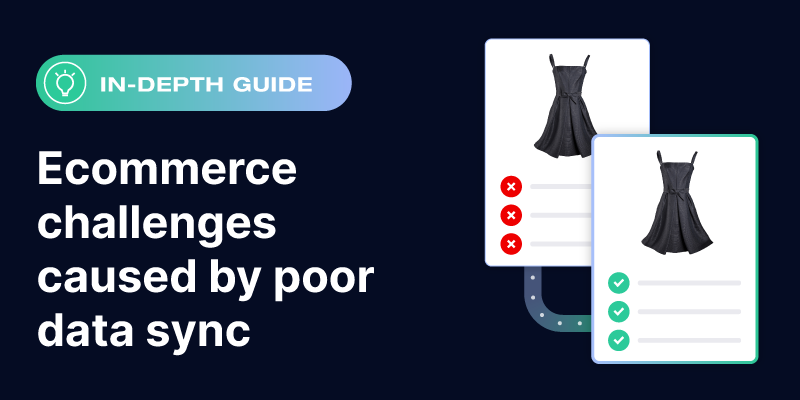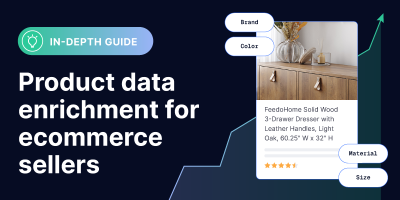In today’s ecommerce landscape, organizations rely on a variety of crucial systems to scale their operations effectively.
If data is what connects these systems, then keeping product information up-to-date across your tech stack and sales channels is one of the most important parts of a successful ecommerce strategy.
This only becomes more difficult as you expand your catalog, update products, run promotions, sell on more channels, and employ strategies that bridge your online and offline business.
This blog outlines the challenges poor data synchronization can cause and what technology exists to streamline the process.
Account suspensions, product disapprovals, and warnings
It takes regular maintenance to ensure your source data matches the information in your listings. For example, if a price changes on your website, but not quickly enough in your product ad, a channel like Google will flag that discrepancy and penalize you.
According to a Feedonomics study, more than 50% of all Google account suspension and product disapproval warnings stem from price or availability errors.
These issues can lead to limited performance or worse. Disapproved products stop showing across Google, while account suspensions affect your entire catalog.
Few businesses can survive such disruption to a critical revenue stream.
Rising order defect rates due to overselling
Marketplaces like Amazon and Walmart monitor order defect rates (ODR) closely. When customers cancel orders or leave negative reviews due to delayed orders caused by overselling, your ODR can increase.
When your ODR exceeds a marketplace’s acceptable limit, you can face account suspensions or financial penalties.
For example, an ODR greater than 1% on Amazon can result in the marketplace limiting your product visibility, restricting your ability to offer certain promotions, or even terminating your seller account.
For sellers with a wide range of products but limited stock for each SKU, the risk of overselling is much higher since they can’t rely as heavily on buffers to cushion their reported inventory counts. Boutiques, niche product sellers, artisans, and brands that rely on limited edition or flash sales are all vulnerable to this issue.
If you’re using your online channels to drive in-store traffic—like local inventory ads on Google—customers are relying on your ability to accurately report what products you have available. Customers who arrive at your store only to find an item out of stock won’t be happy.
Prevent overselling and product disapprovals with Event Driven Sync
Dynamic pricing requirements
If you have products that vary in price, it’s difficult to keep your online listings up-to-date with the speed and frequency of changes.
Consider a precious metals seller whose products fluctuate according to the current market price of gold, or a hotel bookings website with prices that change depending on the demand and time of booking.
Without a way to trigger dynamic pricing changes, your products won’t be priced as accurately or competitively.
Required integrations for third-party instant commerce services
Some third-party marketplaces and delivery services require real-time synchronization for you to integrate your product feeds with their platforms.
This is because stock discrepancies can hurt the reputation of their instant commerce services.
Sellers who are unable to synchronize their product feeds with these third-party platforms may lose business to competitors whose systems are more instant-commerce compatible.
Limited-time offerings that require updated listing information
Businesses that offer limited-time products or services like travel deals, prepared foods, or daily flash sales need to provide reliable information to their customers in these listings.
Detailed and accurate product listings are a crucial part of the consumer decision-making process. According to a 2023 study from VML, 46% of global shoppers say accurate product descriptions influence them the most when shopping online, ranking above other types of content like high-quality images, branding, readability, and even checkout speed.
Inaccurate listings can hurt customers’ trust in your brand, and dissuade consumers from purchasing your products.
Update any product attribute in real-time with Feedonomics
Diverse systems that do not easily export data
Enterprise companies with a diverse tech stack are sometimes limited by their slowest system, which can delay data imports and exports.
Let’s say you have an ecommerce platform, order management system, and a customer relationship management platform. Product data is housed in multiple databases, and if they’re not working in unison, updates to product listings, order data, and other customer information may display inaccurately across these systems and your sales channels.
Processing times are too long
Businesses with very large catalogs—those with hundreds of thousands or millions of SKUs—face unwanted delays when the processing time and system resource costs prohibit large-scale product data updates.
This can be especially problematic when merchants want to make changes to only a small number of products, but limitations within their current systems force brands or retailers to export their entire catalog each time.
Channel rate limits
Sales channels often impose API rate limits, restricting the number of updates a seller can make within a given timeframe.
For example, Criteo’s Retail Media API allows a maximum of 250 calls per minute. When sellers attempt to go beyond the API call limit, they won’t be able to perform the actions they expect and will receive an error message.
These limitations can hinder your ability to make necessary listing adjustments promptly and can be detrimental to your business when critical updates need to be pushed through en masse.
Scalable, real-time data synchronization
Feedonomics helps brands and retailers overcome all of these challenges with Event Driven Sync technology, which enables sellers to update any attribute—including key information like price and availability—in real-time.
Feedonomics is the only solution provider that supports real-time data synchronization for hundreds of ecommerce channels. Our platform is built for scale, has the flexibility to handle the most complex data setups, and includes data governance systems to protect your listings and revenue.

Muhammed is a content marketing specialist creating informative content to help ecommerce professionals solve industry challenges and stay ahead of the curve.

